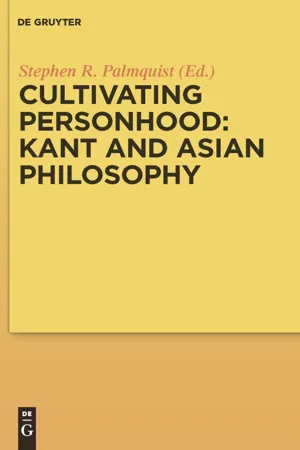
- 862 pages
- English
- PDF
- Available on iOS & Android
Cultivating Personhood: Kant and Asian Philosophy
About This Book
Authors from all over the world unite in an effort to cultivate dialogue between Asian and Western philosophy. The papers forge a new, East-West comparative path on the whole range of issues in Kant studies. The concept of personhood, crucial for both traditions, serves as a springboard to address issues such as knowledge acquisition and education, ethics and self-identity, religious/political community building, and cross-cultural understanding. Edited by Stephen Palmquist, founder of the Hong Kong Philosophy Café and well known for both his Kant expertise and his devotion to fostering philosophical dialogue, the book presents selected and reworked papers from the first ever Kant Congress in Hong Kong, held in May 2009.
Among others the contributors are Patricia Kitcher (New York City, USA), Günther Wohlfahrt (Wuppertal, Germany), Cheng Chung-ying (Hawaii, USA), Sammy Xie Xia-ling (Shanghai, China), Lau Chong-fuk (Hong Kong), Anita Ho (Vancouver/Kelowna, Canada), Ellen Zhang (Hong Kong), Pong Wen-berng (Taipei, Taiwan), Simon Xie Shengjian (Melbourne, Australia), Makoto Suzuki (Aichi, Japan), Kiyoshi Himi (Mie, Japan), Park Chan-Goo (Seoul, South Korea), Chong Chaeh-yun (Seoul, South Korea), Mohammad Raayat Jahromi (Tehran, Iran), Mohsen Abhari Javadi (Qom, Iran), Soraj Hongladarom (Bangkok, Thailand), Ruchira Majumdar (Kolkata, India), A.T. Nuyen (Singapore), Stephen Palmquist (Hong Kong), Christian Wenzel (Taipei, Taiwan), Mario Wenning (Macau).
Frequently asked questions
Information
Table of contents
- Frontmatter
- Contents
- Editor’s Introduction
- Keynote Essay to Book One
- Keynote Essay to Book Two
- Keynote Essay to Book Three
- 1. Self-Cognition in Transcendental Philosophy
- 2. A Neglected Proposition of Identity
- 3. Kant and the Reality of Time
- 4. The Active Role of the Self in Kant’s First Analogy
- 5. Kant’s Attack on Leibniz’s and Locke’s Amphibolies
- 6. The First Paralogism, its Origin, and its Evolution: Kant on How the Soul Both Is and Is Not a Substance
- 7. Kants Logik des Menschen – Duplizität der Subjektivität
- 8. Antinomy of Identity
- 9. Kant’s Critical Concept of a Person: The Noumenal Sphere Grounding the Principle of Spirituality
- 10. Truth, Falsehood and Dialectical Illusion: Kant’s Imagination
- 11. Persons as Causes in Kant
- 12. The Cognitive Dimension of Freedom as Autonomy
- 13. Respect for Persons as the Unifying Moral Ideal
- 14. Kant and Virtuous Action: A Case of Humanity
- 15. Freedom and Value in Kant’s Practical Philosophy
- 16. Moral Individuality and Moral Subjectivity in Leibniz, Crusius, and Kant
- 17. Aesthetic Judgment and the Unity of Reason
- 18. Thinking with Instruments: The Example of Kant’s Compass
- 19. Common Sense and Community in Kant’s Theory of Taste
- 20. Aesthetics and Morality in Kant and Confucius: A Second Step
- 21. China, Nature, and the Sublime in Kant
- 22. Is There a Kantian Perspective on Human Embryonic Stem Cells?
- 23. When Is a Person a Person – When Does the “Person” Begin?
- 24. Personhood and Assisted Death
- 25. Human Dignity and the Innate Right to Freedom in National and International Law
- 26. “Irgend ein Vertrauen … muss … übrig bleiben”: The Idea of Trust in Kant’s Moral and Political Philosophy
- 27. Autocracy: Kant on the Psycho-Politics of Self-Rule
- 28. Die Person als gesetzgebendes Wesen
- 29. Kant’s Realm of Ends: A Communal Moral Practice as Locus for the Unity of Moral Personhood
- 30. Kant’s Notion of Perfectibility: A Condition of World-Citizenship
- 31. Person and Character in Kant’s Anthropology from a Pragmatic Point of View
- 32. Kant and the Possibility of the Religious Citizen
- 33. Autonomy and the Unity of the Person
- 34. Religious Fictionalism in Kant’s Ethics of Autonomy
- 35. Respect for Persons as Respect for the Moral Law: Nicolai Hartmann’s Reinterpretation of Kant
- 36. The Unity of Human Personhood and the Problem of Evil
- 37. How To Be a Good Person Who Does Bad Things
- 38. Kant’s Idea of Autonomy as the Basis for Schelling’s Theology of Freedom
- 39. Moral Theology or Theological Morality?
- 40. Self-Knowledge and God in the Philosophy of Kant and Wittgenstein
- 41. Kant’s Philosophy of Religion as the Basis for Albert Schweitzer’s Humanitarian Awareness
- 42. Kant’s Religious Perspective on the Human Person
- 43. Mou Zongsan’s Critique of Kant’s Theory of Self-Consciousness in the First Critique
- 44. Mou Zongsan and Kant on Intellectual Intuition: A Reconciliation
- 45. On Kant’s Duality of Human Beings
- 46. Mou Zongsan’s Interpretation of the Kantian Summum Bonum in Relation to Perfect Teaching (Yuanjiao 圓教)
- 47. Confucianism and Things-in-themselves (Noumena): Reviewing the Interpretations by Mou Zongsan and Cheng Chung-ying
- 48. The Kantian Good Will and the Confucian Sincere Will: The Centrality of Cheng (誠, “Sincerity”) in Chinese Thought
- 49. Desire and the Project of Moral Cultivation: Kant and Xunzi on the Inclinations
- 50. Kant and Daoism on Nothingness
- 51. Competing Conceptions of the Selfin Kantian and Buddhist Moral Theories
- 52. What Is Personhood? Kant and Huayan Buddhism
- 53. Kant and the Buddha on Self-Knowledge
- 54. Kant and Vasubandhu on the “Transcendent Self”
- 55. Kant’s Moral Philosophy in Relation to Indian Moral Philosophy as Depicted in Srimad-Bhagavad-Gita
- 56. Human Personhood at the Interface between Moral Law and Cultural Values
- 57. The Idea of Moral Autonomy in Kant’s Ethics and its Rejection in Islamic Literature
- 58. The Kantian Model: Confucianism and the Modern Divide
- 59. Asian Hospitality in Kant’s Cosmopolitan Law
- 60. Doing Good or Right? Kant’s Critique on Confucius
- 61. The Exclusion of Asia and Africa from the History of Philosophy: Is Kant Responsible?
- 62. Menschliche Autonomie als Aufgabe – der Autonomiebegriff in der Geschichtsphilosophie Kants
- 63. Is Kant a Western Philosopher?
- 64. The Unity of Architectonic Reasoningin Kant and I Ching
- Backmatter